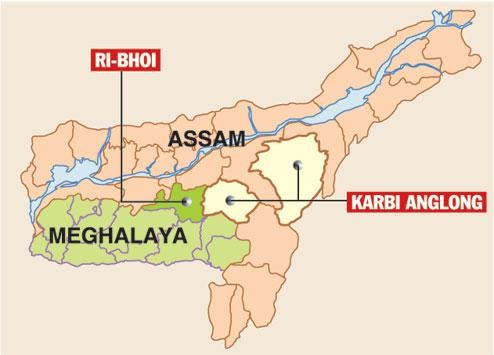Assam-Meghalaya Border Dispute | 24 Nov 2022
For Prelims: Assam-Meghalaya Border Dispute, Article 263 of the Constitution
For Mains: Interstate-border Disputes and Related Issues
Why in News?
Recently, six people were killed and several others injured during an alleged clash between the Assam Police and a mob in an area bordering the West Karbi Anglong district of Assam and Mukroh village in Meghalaya’s West Jaintia Hills.
- The killings come ahead of the second phase of talks between the two states to resolve their boundary dispute.
What is Assam-Meghalaya Border Dispute?
- About:
- Assam and Meghalaya have a longstanding dispute in 12 stretches of their 884-km shared border.
- The Assam-Meghalaya border dispute are the areas of Upper Tarabari, Gazang reserve forest, Hahim, Langpih, Borduar, Boklapara, Nongwah, Matamur, Khanapara-Pilangkata, Deshdemoreah Block I and Block II, Khanduli and Retacherra.
- History:
- During British rule, undivided Assam included present-day Nagaland, Arunachal Pradesh, Meghalaya and Mizoram.
- Meghalaya was carved out in 1972, its boundaries demarcated as per the Assam Reorganisation (Meghalaya) Act of 1969, but has held a different interpretation of the border since.
- In 2011, the Meghalaya government had identified 12 areas of difference with Assam, spread over approximately 2,700 sq km.
- During British rule, undivided Assam included present-day Nagaland, Arunachal Pradesh, Meghalaya and Mizoram.
- Major Point of Concern:
- A major point of contention between Assam and Meghalaya is the district of Langpih in West Garo Hills bordering the Kamrup district of Assam.
- Langpih was part of the Kamrup district during the British colonial period but post-Independence, it became part of the Garo Hills and Meghalaya.
- Assam considers it to be part of the Mikir Hills in Assam.
- Meghalaya has questioned Blocks I and II of the Mikir Hills -now Karbi Anglong region - being part of Assam.
- Meghalaya says these were parts of erstwhile United Khasi and Jaintia Hills districts.
- Attempts to Resolve Dispute:
- In 1985, under the Assam chief minister and Meghalaya chief minister, an official committee was constituted under the former Chief Justice of India Y V Chandrachud.
- However, a solution was not found.
- Both state governments identified six out of 12 disputed areas for resolution in the first phase:
- Three areas contested between West Khasi Hills district in Meghalaya and Kamrup in Assam, two between RiBhoi in Meghalaya and Kamrup-Metro, and one between East Jaintia Hills in Meghalaya and Cachar in Assam.
- After a series of meetings and visits by teams to the disputed areas, both sides submitted reports based on five mutually agreed principles:
- Historical perspective, ethnicity of local population, contiguity with boundary, peoples’ will and administrative convenience.
- A final set of recommendations were made jointly:
- Out of 36.79 sq km of disputed area taken up for settlement in the first phase, Assam would get full control of 18.46 sq km and Meghalaya of 18.33 sq km.
- In March 2022, a Memorandum of Understanding was signed based on these recommendations.
- The second round of discussions for the remaining six phases is to commence by the end November 2022.
- In 1985, under the Assam chief minister and Meghalaya chief minister, an official committee was constituted under the former Chief Justice of India Y V Chandrachud.
What Additional Can be done to Resolve the Dispute?
- Boundary disputes between the states can be settled by using satellite mapping of the actual border locations.
- Reviving the Inter-state council can be an option for resolution of an Inter-state dispute.
- Under Article 263 of the Constitution, the Inter-state council is expected to inquire and advise on disputes, discuss subjects common to all states and make recommendations for better policy coordination.
- Similarly, Zonal councils need to be revived to discuss the matters of common concern to states in each zone—matters relating to social and economic planning, border disputes, inter-state transport, etc.
- India is the epitome of unity in diversity. However, in order to strengthen this unity furthermore, both the centre and state governments, need to imbibe the ethos of cooperative federalism.
Which Other States of India are Involved in Border Disputes?
- Belagavi Border Dispute:
- The Belagavi Border Dispute is between the states of Maharashtra and Karnataka.
- Belgaum or Belagavi is currently part of Karnataka but is claimed by Maharashtra.
- In 1957, slighted by the implementation of the States Reorganisation Act, 1956, Maharashtra demanded readjustment of its border with Karnataka.
- The Belagavi Border Dispute is between the states of Maharashtra and Karnataka.
- Odisha’s Border Dispute:
- The Odisha Border Dispute is between the states of Odisha and Andhra Pradesh.
- Odisha and Andhra Pradesh have been locked in a territorial dispute over Kotia gram panchayat since 1960. Disputes pertain over 21 villages in Kotia gram panchayat.
- In 2006, Odisha sent a complaint to the Central Government under Section 3 of the Inter-State River Water Disputes (ISRWD) Act, 1956 regarding its water disputes with Andhra Pradesh pertaining to Inter-State River Vamsadhara.
UPSC Civil Services Examination, Previous Year Question (PYQ)
Q. Constitutional mechanisms to resolve the inter-state water disputes have failed to address and solve the problems. Is the failure due to structural or process inadequacy or both? Discuss. (2013)

